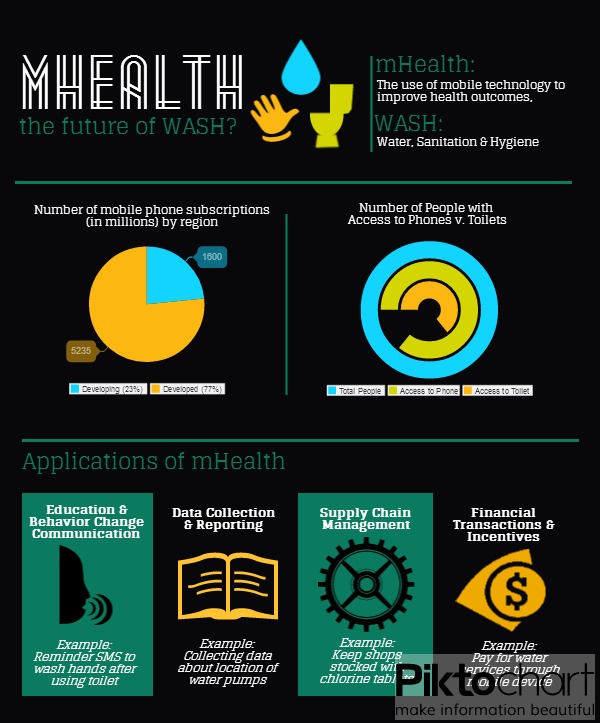Last month, 130 doctors, nurses, development workers, techies, government officials, and academics from 35 countries joined us on an exciting four-week journey through the latest developments in mHealth.
Imagine how difficult (and expensive) it would have been to assemble this group into one classroom in person!
Thanks to the amazing team at the mHealth Alliance and an all star-roster of incredible experts, we managed to build upon the great success of our inaugural effort and deliver a powerful second installment of the online certificate course TC309: Mobile Phones for Public Health.
Three observations/trends emerged during the course:
- Mobile data collection most discussed! Mobile data collection, management and analysis gained significant attention in the course forums. We were thrilled to be joined by Yaw Onokwa, one of the founders of Open Data Kit and Jeremy of CommCare who provided students with live demos of their respective software packages and shared a number of insights and best practices for developing surveys, acquiring and managing users, scaling data projects and more. The always-engaging Alain Labrique (Johns Hopkins University) joined us for a fantastic session on the continuum of care that touched on his exciting work in Bangladesh and the importance of investing in the evidence base.
- The importance of human centered design (HCD): Human-centered design also featured prominently throughout the four weeks. Isaac Holman (co-founder of Medic Mobile) led participants through an exercise in drawing/mapping a health ecosystem based on HCD principles. Design experts Erica Kochi (UNICEF Innovation) and Robert Fabricant (Frog Design) shared a wealth of insights from their experiences in successfully launching and sustaining mHealth projects in a number of countries. For many of these world-class practitioners, this was the first time they had ever presented in an online course like this.
- Fewer pilots + design for scale: After the New York Times featured an article last spring entitled The Benefits of Mobile Health on Hold there was certainly a lot of room for debate and critical discussion about “pilotitis”. Patty Mechael noted that one trend she has observed in last year is fewer organizations are starting pilots more are focused on designing for scale from the onset of a project. And finally, Gustav Praekelt shared the amazing work his foundation has undertaken to team up with leading private sector entities in South Africa to achieve scale (1 million+) in fighting HIV and preparing mothers for childbirth.
Three highlights from the course:
- Techies + Healthies: We featured a TEDx Talk by Josh Nesbit titled, “Techies + Healthies”, which prompted an insightful discussion about the need to promote more engagement between practitioners from both fields. We also asked participants to reflect on their own orientation on the healthie – techie spectrum.
- Zombies, Zombies, Zombies: What would a TechChange course be without a Zombie Apocalypse. This time, participants had to respond to an impending zombie invasion and practice gathering vital health and preparedness data using tools like Magpi, FrontlineSMS, CommCare formhub, OpenDataKit and more.
- What a Map! We asked participants to describe the health systems in their own countries and then crowdsourced an interactive Google Map of everyone’s responses. I personally learned a tremendous amount about the challenges and opportunities that exist in other countries through this visualization and am excited to do more of these kinds of activities in future courses.
While there are always improvements to make and things we’ll work to do differently next time, overall, the course was a huge success. But don’t just take my word for it. Of the 30 participants so far who have completed our post-course survey, all 30 said the course fulfilled or surpassed their expectations and 27 out of the 30 said they are likely or very likely to recommend the course to a friend or colleague.
Here’s a selection of what our participants had to say:
- “The blend of high notch experts with various diverse experiences in the mHealth and social spaces, the expert coordination, moderation and tech support by Nick and colleagues, brought practicality and vividness to the course. Are you a healthie or a techie? It does not matter. If you want to do mHealth right, then come to this course.” – Francis, World Vision International
- “I felt truly engaged by this course, and was somewhat surprised by that as other online courses I have taken for credit have felt very distanced and flat in terms of educational energy. If you want to know what the leading experts in mhealth are saying about the state of the field, take this course. The best part? Live webinars that felt like inner circle information (how the insiders talk over drinks) coupled with direct access to ask your specific questions through text chat. I can’t wait to take a refresher course next year to see what’s new!” – Kirsten, Rice University
- “The TechChange online course platform is amazing! They provide you with online learning that is exciting, user-friendly and highly informative. The speakers in the mHealth course are really great and I have learned a lot from the presentations and exercises. For people who are busy and cannot catch up on-time (like me!), you don’t need to worry because TechChange has provided a platform where you can retrieve videos, materials, audio recordings. So, go with TechChange as your top online course provider!” – Mary Rose, ACCESS Health International
The TechChange online platform also underwent all kinds of upgrades thanks to the tireless efforts of our dev team led by Will Chester. See what some of our participants had so to say:
- “Here is a learning platform that is designed completely for the convenience of the individual – you can participate in as many sessions as you can and still have opportunity to catch up on those you’ve missed even 4 months after completing the course. You can even rate your performance by the tech points earned and look at what others have earned – which is a great way to motivate or encourage participation.” – Apera Iorwa, mHealth Alliance
- “I thought the platform was great–very dynamic and user-friendly. I’ve taken several other online courses and this was the best platform thus far.” – Kiara Reilly, Booz Allen Hamilton
Stay tuned for details about the fall mHealth course and be sure to check out our lineup of upcoming courses: Social Media for Social Change, Intrapreneurship: Innovating from Within, and Tech for Emergency Management and more.
We’re excited to announce that we’ve teamed up with Mobile Alliance for Maternal Action (MAMA) to support capacity building and learning for their global community of users and implementers.


